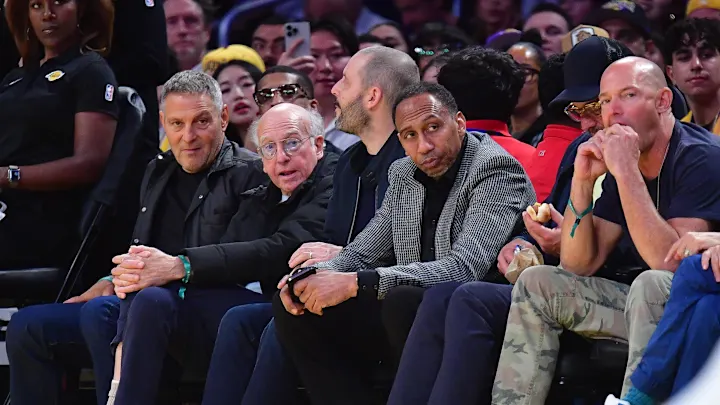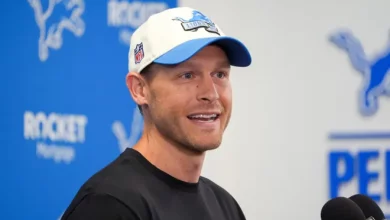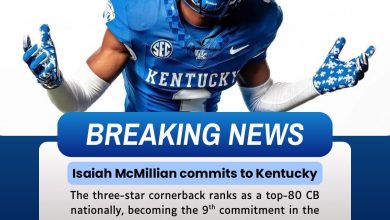‘Confrontation’ With LeBron James: Stephen A. Smith Speaks Out

The world of sports media is often filled with fiery opinions, bold takes, and contentious moments. Few personalities in the industry have achieved as much notoriety as Stephen A. Smith, the outspoken ESPN commentator known for his passionate takes on basketball, football, and almost every other subject that catches his eye. However, Stephen A. Smith’s recent “confrontation” with none other than NBA legend LeBron James has captured the attention of fans, analysts, and media outlets alike. Following a tense exchange that aired on ESPN, the question on everyone’s mind is: How did we get here, and what does this mean for both Smith and LeBron moving forward?
In this article, we dive into the details surrounding the confrontation, the nature of the exchange, and the broader context that has brought Stephen A. Smith and LeBron James into the spotlight for what has become one of the more talked-about moments in sports media in recent memory. From the origins of their conflict to the ways in which both figures have responded, we’ll examine the motivations behind their clash and what it could mean for their relationship moving forward.
The Nature of the “Confrontation”
It all began when Stephen A. Smith, during one of his regular appearances on ESPN’s “First Take,” made some pointed comments about LeBron James and his performance in the 2024 NBA season. Smith, never one to shy away from criticizing the biggest stars in the league, voiced his belief that LeBron James—despite his continued success and remarkable longevity—was beginning to show signs of slowing down, especially as the Los Angeles Lakers entered another pivotal stretch of the season.
Smith’s comments about LeBron’s performance sparked a firestorm across the sports media world. The 20-year veteran of the NBA has been widely regarded as one of the greatest players to ever play the game, and any critique of his performance, especially when made by a high-profile media personality like Smith, tends to catch the attention of fans and players alike.
Smith’s criticism centered on his belief that LeBron had been inconsistent in some key areas of his game—namely his ability to carry the Lakers to victory against elite teams. Smith questioned whether LeBron, now at the age of 40, could continue to lead the Lakers deep into the playoffs, and he also raised concerns about the way LeBron had handled the evolving dynamics of the Lakers roster. While Smith acknowledged LeBron’s continued greatness, he argued that the pressure on him to perform at a superstar level every night had started to catch up with the future Hall of Famer.
These comments did not go unnoticed. As expected, LeBron James himself responded, and this set the stage for an intriguing confrontation that would not only shape the media narrative for weeks to come but also reveal more about the personalities of both figures involved.
LeBron James Responds: A War of Words
After Smith’s comments hit the airwaves, LeBron James took to social media, where he is known for voicing his opinions on various matters. In a now-famous tweet, LeBron made it clear that he was displeased with Stephen A. Smith’s assessment of his game. In his response, LeBron expressed his frustration, asserting that he had done enough to prove his worth over the years and that any doubts about his ability to perform at a high level were misguided.
LeBron’s tweet was not just a reaction to Smith’s criticism; it was also a statement about his legacy. He pointed out that his level of play remained exceptional and that his drive to win had not diminished despite the challenges he faced throughout his career. While LeBron has often remained diplomatic in public, his response to Smith marked a rare moment of direct confrontation with a media figure—a sign that even LeBron James, the perennial superstar, has his limits when it comes to criticism.
LeBron’s post quickly went viral, sparking debates on social media and among sports commentators. Some defended LeBron, stating that his accomplishments on the court speak for themselves and that Stephen A. Smith had overstepped in questioning his performance. Others supported Smith’s critique, arguing that LeBron had indeed shown signs of vulnerability and that Smith’s comments were grounded in reality, considering the ever-evolving nature of the NBA.
However, the most interesting aspect of this entire situation was not the back-and-forth on social media—it was the very public and very direct interaction between Stephen A. Smith and LeBron James during an ESPN segment shortly after the initial confrontation.
The ESPN Segment: The Confrontation on Live TV
After LeBron’s response on social media, the two personalities came face to face on a live segment on “First Take,” the flagship show on ESPN where Stephen A. Smith regularly debates the biggest issues in sports. The atmosphere was tense, as both Smith and LeBron entered the conversation with clear intentions to express their viewpoints.
The segment began with Stephen A. Smith trying to address the public back-and-forth between himself and LeBron. He was visibly calm and collected, though it was clear that he understood the gravity of the situation. Smith explained that his comments had been taken out of context by some fans and that his intention was never to attack LeBron personally but rather to provide an honest assessment of his performance.
Smith also acknowledged LeBron’s greatness, noting that he had been one of the best players in the league for nearly two decades. However, he stood by his belief that there were areas of LeBron’s game that had shown signs of decline and that it was important to have a realistic discussion about the state of the Lakers and LeBron’s role in their success.
LeBron, in his typical composed manner, responded directly. He expressed his belief that Stephen A. Smith was being unfair by focusing on his age and supposed inconsistencies, pointing out that his stats and leadership had not significantly dipped and that his commitment to winning was as strong as ever. He also made a point to clarify that, while he respected Smith’s opinion as a media personality, he did not appreciate the timing of the criticism, especially considering the Lakers’ ongoing push for playoff contention.
The exchange was civil, yet charged with underlying tension. Both men had valid points, and the discussion revealed the complexity of the relationship between athletes and the media. On the one hand, Stephen A. Smith was doing his job—offering opinions on the game and the players who define it. On the other hand, LeBron James, as a public figure, felt the weight of constant scrutiny and criticism, especially when it comes to questions about his diminishing skills.
What Was at Stake?
At the heart of this confrontation was more than just a difference of opinion between Stephen A. Smith and LeBron James. There were broader implications at play, particularly regarding how athletes and the media engage with each other in the modern era.
- The Evolution of Sports Media
Stephen A. Smith is a part of a new breed of media personalities who have become as famous as the athletes they discuss. His takes are often provocative, designed to spark conversation and drive ratings. However, this comes at a cost. When criticism crosses into territory that athletes feel is unjust, it can create a rift between them and the media. This is particularly true for high-profile athletes like LeBron James, whose every move is scrutinized by millions.
LeBron, on the other hand, represents a new generation of athletes who are increasingly vocal and proactive about controlling their own narrative. His social media presence, for example, allows him to respond directly to critics and shape how his career is viewed by the public. In this sense, LeBron’s response to Stephen A. Smith’s criticism was indicative of the power athletes now wield in the media landscape. They are no longer passive recipients of analysis; they actively engage in the conversation and, in many cases, push back when necessary.
- Legacy and the Weight of Criticism
LeBron James has achieved almost everything in the NBA. He’s won championships, been named an MVP multiple times, and solidified his place as one of the greatest players in the history of the sport. However, with that success comes immense pressure and a level of scrutiny that few athletes can truly understand. Criticism of LeBron James is not just a critique of his performance; it’s a critique of his entire legacy. As he continues to chase further achievements, any hint of a perceived decline or shortcoming is magnified.
Stephen A. Smith, as a media figure, plays an important role in holding athletes accountable. His job is to analyze the performances of athletes objectively, even when it means challenging their greatness. But LeBron’s response to Smith’s critique shows just how deeply personal these conversations can become, especially when athletes are continuously working to redefine their legacies.
The Aftermath: The Impact on LeBron and Stephen A. Smith
Since the confrontation, both figures have continued their work, but their relationship remains under scrutiny. Stephen A. Smith has continued to voice his opinions on LeBron and the Lakers, but he has done so with more caution, understanding the weight that his words carry. On the other hand, LeBron James, while not engaging in further public back-and-forths, has maintained his focus on his game and the Lakers’ success, using Smith’s comments as fuel to continue proving that he remains one of the best in the business.
As of now, both men have likely moved past the confrontation, but the incident serves as a reminder of the complex relationship between athletes and the media. While Smith’s job is to analyze and critique, LeBron’s job is to perform at the highest level and manage his legacy. The clash between these two figures underscores the realities of fame, media influence, and the power dynamics at play when it comes to shaping public perception.
A New Era of Athlete-Media Relations
The confrontation between Stephen A. Smith and LeBron James has been an eye-opening moment in the ever-evolving world of sports media. While the exchange itself may seem like a momentary clash, it highlights a larger shift in how athletes and media personalities engage with one another. As athletes like LeBron James continue to assert their influence in the media landscape, the lines between analysis, critique, and personal commentary will only continue to blur, making moments like this all the more significant.
For Stephen A. Smith, it was yet another chapter in his career of bold opinions and heated debates. For LeBron James, it was a reminder that even legends are not immune to criticism. In the end, both men will continue to rise in their respective fields—LeBron on the basketball court, and Stephen A. Smith in the world of sports commentary—but their clash serves as a lasting example of the tension that can arise when greatness meets critique.









